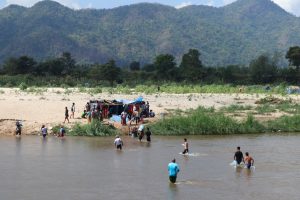When war, conflict, and persecution force people to flee their homelands, it is not only adults who are impacted. According to the United Nations refugee agency, of the forcibly displaced people worldwide at the end of 2021, 41 percent were children below the age of 18. Thailand is home to approximately 100,000 refugees along its border with Myanmar and another 5,000 refugees in urban areas, almost half of whom are children. Due to their physical and psychological vulnerability, extra care and attention must be devoted to protecting refugee children. Despite this, Thai authorities are putting refugee children’s lives and futures at risk.
The Myanmar military junta’s violent crackdown on the civilian population, initiated after its coup d’état of February 1, 2021, has forced individuals and families to seek shelter along the Thailand-Myanmar border in areas controlled by ethnic resistance organizations– non-state armed actors fighting a revolution against the Myanmar military. As the Myanmar military intensifies its attacks on these areas, tens of thousands of displaced civilians seeking safety have been forced across the border into Thailand.
Once in Thailand, however, they are not always safe.
Recently, I visited one of Thailand’s border cities and talked with ethnic Karen teachers from Myanmar caring for approximately 100 children aged between three and 17 years of age. They told me how Thai authorities have pushed them and their students back to Myanmar several times since December 2021. The teachers described how, on some occasions, multiple Thai soldiers, police, and administrative officials, fully equipped with uniforms and weapons, stormed their shelter in the middle of the night, ordering them to return. They told me how the children under their care were terrified – crying, shaking, and wetting their pants.
Continuously pushing refugees, including children, back to conflict zones in Myanmar not only puts lives at immediate risk but also inflicts unnecessary trauma. The teachers I spoke with described how it is almost impossible to continue to educate their students given the instability caused, at least in part, by the Thai authorities’ actions.
Unfortunately, the violations described to me by these teachers are not isolated incidents. They represent a longstanding trend and appear to be Thai government policy.
As Thailand has not ratified the 1951 U.N. Refugee Convention, all refugees without a proper travel document are subject to arrest and detention. Even though the government signed an agreement to stop the detention of migrant children in 2019, parents are still subject to immigration arrest and detention. As a result, the children of detained refugees either remain with their parents in the immigration facilities or are left to survive on their own.
Moreover, while the Thai government espouses that all children are eligible for primary education, in reality, refugee children face challenges and barriers. Their lack of protection in Thailand, in addition to societal discrimination, prevents them from attending school and assimilating. Most end up staying in closed rooms within their small, insular refugee community.
As a signatory to the U.N. Convention on the Rights of the Child, the Thai government is obliged to uphold the rights of all children in Thailand. When signing up for this landmark human rights treaty, however, the government issued a “reservation” – a legal “opt-out” – to Article 22 of the Convention. This article specifically guarantees the rights of refugee children and commits states to work with the U.N. to protect child refugee rights.
Thailand is the only country out of the 193 nations that have signed the Convention on the Rights of the Child to lodge a reservation to Article 22. The U.N. Committee on the Rights of the Child, which monitors the implementation of the convention, has recommended that the Thai government withdraw its reservation and “take all necessary measures to protect the rights and assist all asylum-seeking and refugee children in the country.” Until now, however, the Thai government has failed to withdraw its reservation.
There is no logical, moral, or sound political reason why the Thai government retains its reservation to Article 22. This position is instead driven by an exaggerated concept of “national security” and an inaccurate notion that taking a more progressive stance on refugee rights would create a “pull factor” for refugees fleeing for their lives.
The government of Thailand should exercise a genuine and sincere commitment to upholding and protecting children’s rights, including refugee children. It should immediately reverse its reservation to Article 22 of the Convention on the Rights of the Child, protect all refugee children, and begin addressing the “push factors” and root causes of the refugee situation, particularly the humanitarian crisis that continues to brew in Myanmar.

































